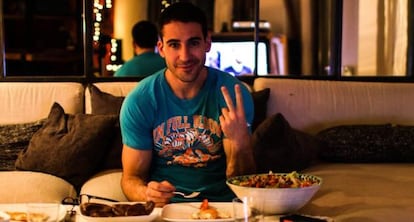Spanish celebrities line up for a slice of Twitter product placement
TV stars and Real Madrid’s Iker Casillas among those pushing brands in their personal messages

In 2012 the price of a tweet by US celebrity Kim Kardashian was €10,000. Back then, advertising on the social networks through famous people’s private accounts was already an established practice. In Spain, the first trial runs were taking place on Facebook and Twitter, and to a lesser extent Instagram.
But since the summer, product placement and brand publicity have become increasingly common among Spanish celebrities’ personal postings.
On May 30 soccer star Iker Casillas, who is captain of Real Madrid and the Spanish national team, published the following comment on @CasillasWorld, which has 1.62 million followers: “Ummm que ricas, claro que sí, son mis favoritas!! ;)” (“Mmm, how delicious, of course, they’re my favorite!”), followed by the hashtag #SomosFutbol (WeAreSoccer) and a link to the official account of Lay’s potato chips.
Two months before that, actor Miguel Ángel Silvestre (@ma_silvestre) who has 309,000 followers, uploaded several videos and photographs of the dinners he prepares on Monday to watch Velvet, the TV series in which he stars: there was spaghetti, rice, peppers ... and a bag of Florette ready-to-eat lettuce.
From an ethical viewpoint it could be regarded as covert advertising” Marcos Morales, Tinkle agency
In Casillas’ case, the advertising was explicit. The Madrid goalkeeper has signed a contract with Lay’s for the World Cup, which kicks off on Thursday.
But what about Silvestre’s healthy meals? This kind of marketing arrived in Spain “in a pretty natural way,” according to Eduard Corral of Buzz, an advertising agency specializing in the social networks.
“This type of advertising began a couple of years ago, but lately it has become more intense,” he explains. Before that, you could even get a brand mentioned a few times for free. “Now you do it for a contract that normally includes something more than tweets – spots, events ...”
Another change in the market is who seeks out who. It used to be that brands would get in touch with the names that interested them, but now “some celebrities proactively look for this type of operation,” says Corral.
Advertising has reached celebrities’ private homes, as shown by the footage of Miguel Ángel Silvestre’s living room with the television reflected in the mirror as he eats his dinner.
Fashion bloggers had been promoting brands on their websites for around seven years. The progression to the social networks was just a matter of time. “They first of all used accounts that were already influential on the internet as amplifiers on the social networks, people like the blogger Lovely Pepa. Later came the people we call the offline influential,” adds Corral. Musician Alejandro Sanz is a good example of a respected professional who now has great powers of conviction online. And great profitability, of course.

“It depends on the fees. Around €3,000 is the average for a package,” explains Moisés Fernández, CEO of Avippp, an online marketing agency. A package includes a fixed number of tweets that must be sent out on the social networks at a specific moment. “That average can also depend on whether it’s a short-term or long-term campaign, a national or international one,” he says.
The fees shoot up when the celebrity in question is an elite sportsman such as Iker Casillas, Rafa Nadal or Pau Gasol. “They are in high demand. What [brands] want are people with a lot of followers whose personality coincides with the brand’s values,” Fernández says.
Yet it is not always as clear or as easy as that. Santiago de Mollinedo, director general of marketing consultancy Personality Media, notes that “even the advertisers are a bit disoriented. You cannot rely on the number of followers. You have to consider how active they are and the quality of their interactions with the celebrity.”
“Major companies have abandoned this practice because they did not know whether there had been any return on their investment,” he adds.
Because brand-sponsored events have shrunk with the crisis, celebrities are beginning to view this kind of publicity as a new source of financing. “Especially the unconsolidated characters, like those whose fame rests on a reality show,” says Marcos Morales, of the communication agency Tinkle. “From an ethical viewpoint it could be regarded as covert advertising. Ultimately it is nothing more than a deception taking place in a legally gray limbo. But maybe we’ve just all gone crazy trying to control something that the big media have been doing all their lives.”
Tu suscripción se está usando en otro dispositivo
¿Quieres añadir otro usuario a tu suscripción?
Si continúas leyendo en este dispositivo, no se podrá leer en el otro.
FlechaTu suscripción se está usando en otro dispositivo y solo puedes acceder a EL PAÍS desde un dispositivo a la vez.
Si quieres compartir tu cuenta, cambia tu suscripción a la modalidad Premium, así podrás añadir otro usuario. Cada uno accederá con su propia cuenta de email, lo que os permitirá personalizar vuestra experiencia en EL PAÍS.
¿Tienes una suscripción de empresa? Accede aquí para contratar más cuentas.
En el caso de no saber quién está usando tu cuenta, te recomendamos cambiar tu contraseña aquí.
Si decides continuar compartiendo tu cuenta, este mensaje se mostrará en tu dispositivo y en el de la otra persona que está usando tu cuenta de forma indefinida, afectando a tu experiencia de lectura. Puedes consultar aquí los términos y condiciones de la suscripción digital.









































